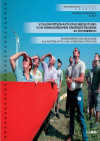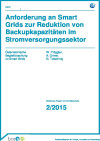Suchergebnisse
Gründerzeit mit Zukunft - Demonstrationsprojekt 3: KA 7 Kaiserstraße - Innovative Sanierung eines denkmalgeschützten Gründerzeitgebäudes mit Innendämmung
Durch die Anwendung eines innovativen Maßnahmenpakets wurde demonstriert, wie ein denkmalgeschütztes Gebäude auf einen hocheffizienten und zeitgemäßen Standard hinsichtlich Komfort und Energieverbrauch gebracht werden kann.
COP5+ - Further development of a heat- and cooling system with seasonal heat storage at the example of Central Europe´s biggest geothermal depth drilling field
The aim was to increase the overall energy efficiency of Plus-Energy-Houses by making the heat excess of summer available for use in winter. This was carried out by improvements of the technology seasonal heat storage to an intelligent overall system. The biggest geothermal depth drilling field in Central Europe has been established.
Energietechnische, baubiologische und nutzerspezifische Begleituntersuchung zu innovativen Baukonzepten, der im Rahmen HAUS DER ZUKUNFT umgesetzten Projekte.

Energietechnische und baubiologische Begleituntersuchung von Demonstrationsgebäuden, die im Rahmen der Programmlinie "Haus der Zukunft" errichtet bzw. saniert werden, wobei auf die Befragung der NutzerInnen in besonderer Weise eingegangen wird.
Urban consolidation Lehen - subproject 6a and 6b: Energy efficient urban districts by means of community organizing and social measures in urban consolidation
Community organizing is used as a method to develop an activating social process to inform and include involved people in the district concerning new buildings but also in the process of urban renewal. Experiences and feedback were worked on scientifically to give feedback to the community as well as to builders and planners.
Sustainable Business Planner - IT-gestütztes Managementtool zur Integration der Leitprinzipien des Impulsprogramms "Nachhaltig Wirtschaften" in Businesspläne.
Weiterentwicklung des etablierten Managementkonzepts Businessplan zum Sustainable Businessplan. Erstellung, Erprobung und Verbreitung des ganzheitlichen nutzerorientierten IT-Tools "Sustainable Business Planner" im Rahmen einer österreichweiten GründerInnen-Initiative.
Increasing of the resources-efficiency by experimental optimisation of steam production and by reduction of production residues in a metal-processing factory
The project is based on the results of the currently running project "Use of waste heat and renewable energy sources in a metal-processing factory". In this project it was found, that nearly the half of the consumption of natural gas is needed for steam production. Based on calculations already carried out, it is planned to investigate experimentally the possibilities of increasing the resource-efficiency by lowering the steam temperature and by replacing steam by hot water. Further increasing of resource-efficiency shall be achieved by use of internal residues as an additional fuel in a solid fuel furnace.
Conference: The European Roundtable on Sustainable Consumption and Production (ERSCP) and Environmental Management for Sustainable Universities (EMSU)
25. - 29. October 2010
Knowledge Campus Delft
Delft, NL
The ERSCP provides a platform to stimulate, develop and disseminate new initiatives to foster the implementation of sustainable consumption and production concepts and approaches within local and regional sustainable development initiatives. The conference will take place in Delft and in Cape Town.
Entwicklung eines Verfahrens und einer Anlage zur industriellen Applikation von umweltfreundlichen mineralölfreien Umformschmierstoffen bei Tiefziehprozessen
Eliminierung des Einsatzes mineralölbasierender Umformschmierstoffe durch eine neuartige Anlage zur sprühnebelfreien, kontaktgebundenen Auftragung von umweltfreundlichen Wachsemulsionsschmierstoffen bei industriellen Tiefziehprozessen.
Entwicklung von Rührwerksystemen mit optimalem Mischverhalten in Biogasanlagen und verringertem Energiebedarf mittels numerischer Strömungssimulation (AD-CFD)
Ziel dieses Projektes ist es, das Mischverhalten sowie die Performance von Rührsystemen in Biogasanlagen zu erfassen und mittels CFD-Simulation mathematisch darzustellen. Aus diesen Simulationen können das aktuelle Mischverhalten sowie Rückschlüsse auf optimale Reaktorgeometrien und Positionierung von Rührsystemen, optimale Rührwerkskombinationen und minimierter Energieeinsatz abgeleitet werden.
Baubionik Potenziale - Interdisziplinäre Identifikation und Aufbereitung von innovativen bionischen Schlüsseltechnologien für "Plus-Energie Gebäude der Zukunft"
ExpertInnen aus unterschiedlichsten Industrie und Forschungszweigen und VertreterInnen aus der Bionik erarbeiteten innovative Ideen zum Thema "Schlüsseltechnologien für Plus-Energie-Gebäude". Die Ergebnisse dienen als Sammlung emergenter bionischer Forschungspotenziale für die Umsetzung von Innovationsforschung im österreichischen Bausektor.
Criteria for Sustainable Urban Development - Tool for the Development and Assessment of urban brownfields

Based on experiences made with the projects "solarCity" and "Eco Building" resp. "Total Quality Assessment" the project will define qualitative and quantitative criteria for sustainable urban development considering Greater Linz as example.
CIT City in Transition - A Model for Comprehensive Renewal Processes to Increase the Value of Urban Areas

By means of pilot projects in two urban areas comprehensive goals and criteria, assessment approaches and a code of practice for sustainable urban renewal are elaborated jointly with decision makers and experts in urban development.
Volkswirtschaftliche Bedeutung Von Erneuerbaren Energieträgern In Österreich

Windenergie und Biomasse als Wirtschafts- und Arbeitsplatzfaktor
Forschungsforum
2/2003
Herausgeber: BMVIT
Deutsch, 6 Seiten
Downloads zur Publikation
Das Passivhaus in der Praxis, Strategien zur Marktaufbereitung für das Passivhaus im Osten Österreichs

Strategien zur Marktaufbereitung für das Passivhaus im Osten Österreichs
Anforderung an Smart Grids zur Reduktion von Backupkapazitäten im Stromversorgungssektor

Österreichische Begleitforschung zu Smart Grids
Schriftenreihe
2/2015
W. Prüggler, A. Ortner, G. Totschnig
Herausgeber: BMVIT
Deutsch, 61 Seiten
Downloads zur Publikation
Intensified Density - Nachverdichtungsstrategien für den periurbanen Raum
12. Oktober 2017
Haus der Architektur, Mariahilferstraße 2, 8020 Graz, AT
Im Rahmen des "Stadt der Zukunft" Forschungsprojektes Intensified Density diskutieren internationale StadtplanerInnen und ArchitektInnen über architektonische und städtebauliche Möglichkeiten nachhaltiger Nachverdichtung in Randgebieten unserer Städte.
Stand der Technik bei der Bewertung des Risikos durch Eisfall von Windkraftanlagen
18. Juni 2019
Winzerhof & Heuriger Familie Bauer, Ederdingerstraße 3, Weidling 3125 Statzendorf, Statzendorf-Weidling, AT
Präsentation von objektivierten Maßnahmen und Richtlinien, die zu einer Reduktion des Eisfallrisikos führen sowie Vorstellung Eisatlas Österreich.
Online-Workshop "Digitale Schlüsseltechnologien für eine kreislaufbasierte Produktion"
11. Oktober 2022
Online, AT
Ziel des Workshops ist die gemeinsame Entwicklung zukunftsträchtiger Anwendungsfelder, Ableitung von Forschungsthemen sowie die Vernetzung der Communitys aus den Bereichen Produktion, Digitalisierung und Kreislaufwirtschaft.
IÖB-Tool Gebäude und Erneuerbare Energietechnologien. Bewertungsinstrumente jetzt downloadbar
Die Module des IÖB-Tools (Bewertungsinstrumente für innovationsfördernde öffentliche Beschaffung) bieten vor allem hinsichtlich Innovations- und Risikobewertung Hilfestellung bei der BestbieterInnenauswahl.
Konferenz: Going Green - CARE INNOVATION 2010 Conference and Exhibition on Electronics and the Environment
8. - 11. Nov 2010
Konferenzzentrum Schönbrunn
Wien, AT
Throughout the world Going Green - CARE INNOVATION 2010 is the only event, where experts from the electr(on)ics, automotive, electricity, chemical and recycling industry as well as consulting and public authorities set the course for future trends in technologies, markets and sustainability.
